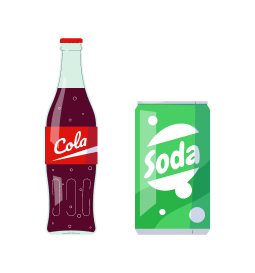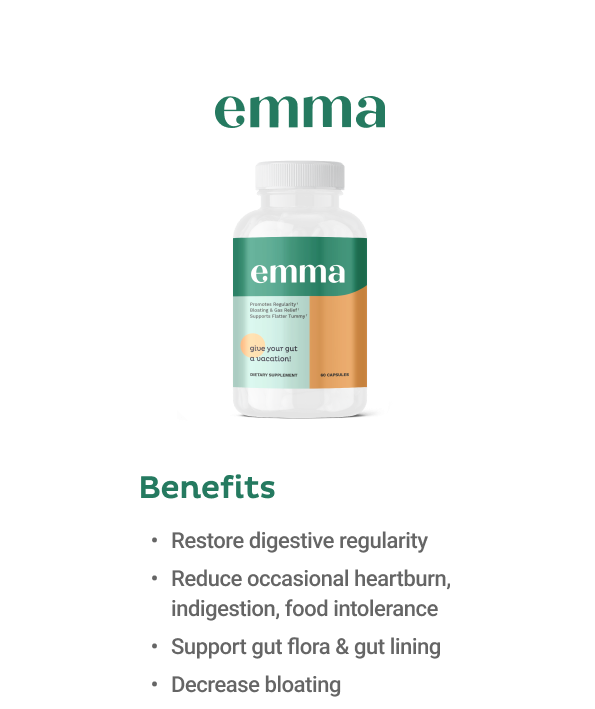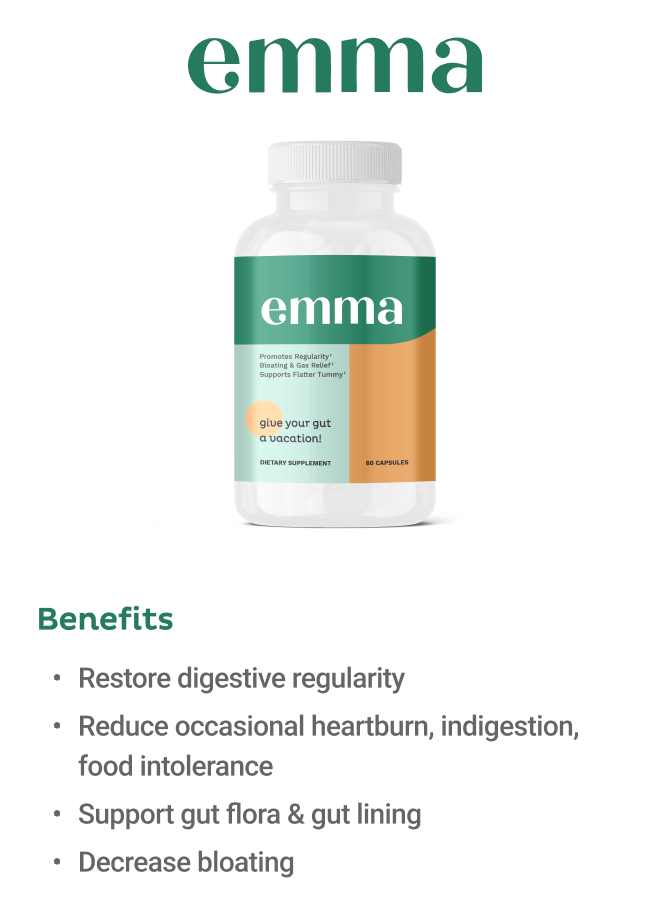Feeling embarrassed with your puffy belly and fighting the urge to unbutton your jeans? Whether it’s after a sumptuous lunch out with friends, due to an upset stomach, or just because it’s that time of the month, occasionally feeling bloated is quite normal and happens to the best of us.
Bloating is that uncomfortable sensation where your belly feels tight and full, feeling like there’s trapped gas. Sometimes, it also leads to your stomach swelling, making it noticeably larger around the middle.
In this article, we look at the common causes of bloating, the typical food culprits that cause it, and how to feel better quickly and prevent this uncomfortable feeling from coming back.
Common Causes
of Bloating
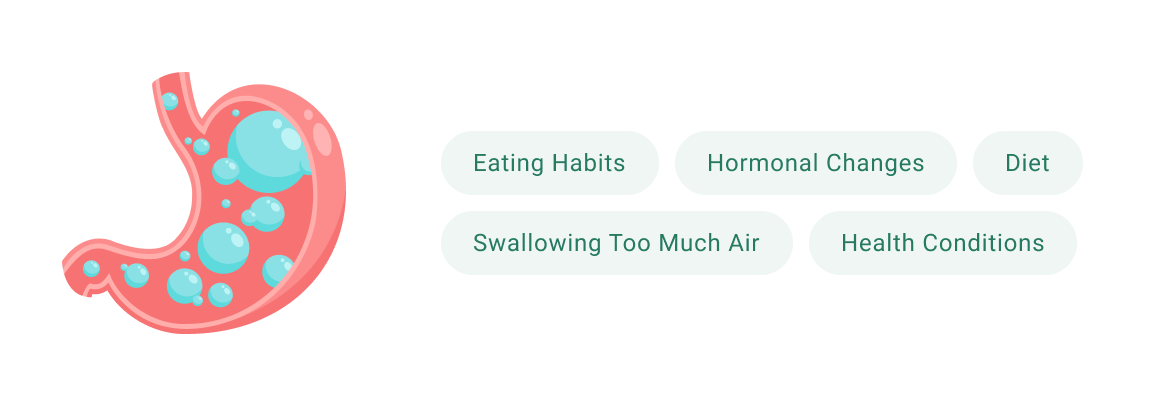
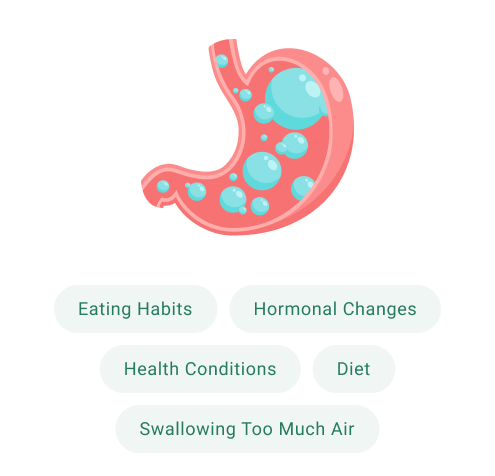
One in seven Americans experience bloating every week. There are many possible reasons why you feel bloated. Here are the most common ones:
Eating Habits
Excess gas is the most common cause of bloating. Because intestinal gas is the byproduct of good bacteria breaking down the food you eat, your eating habits and diet play a huge role in bloating. These include:
-
Eating dinner too close to bedtime:
lying down right after eating doesn’t give the body time to digest food, leading to indigestion, gas, and discomfort
-
Eating too much:
overeating stretches your stomach. This extra volume increases the pressure in your abdomen, leading to bloating. There’s also a lot of food your gut bacteria has to break down, leading to more gas.
-
Eating too fast:
Eating in a rush causes you to swallow more air. You also tend not to chew thoroughly, which makes food longer to digest. Eating too fast also results in overeating. All these lead to gas and bloating.
Diet
Your diet is closely linked to gas production and, subsequently, bloating. Eating foods that are slow or hard to digest, including beans, certain fruits and vegetables, and whole grains, can lead to increased gas in your digestive tract. Greasy, fatty, and fried foods also digest slowly, making you feel full and bloated.
Food intolerances and sensitivities can also cause gastrointestinal (GI) symptoms like bloating, diarrhea, and cramping. For example, lactose intolerant people struggle to digest lactose, a sugar in dairy products. Similarly, those with gluten sensitivity react negatively to gluten, a protein in barley, wheat, and rye.
Swallowing Too Much Air
Talking during meals, chewing gum, and sucking candy can inadvertently make you gulp excess air (aerophagia) and cause bloating. Sorbitol, an artificial sweetener found in many chewing gums and candies, can also cause gastrointestinal (GI) symptoms, depending on the amount consumed.
Using a straw can also make you swallow more air, as you end up sipping air with your drink, which doesn’t happen when you drink directly from a glass.
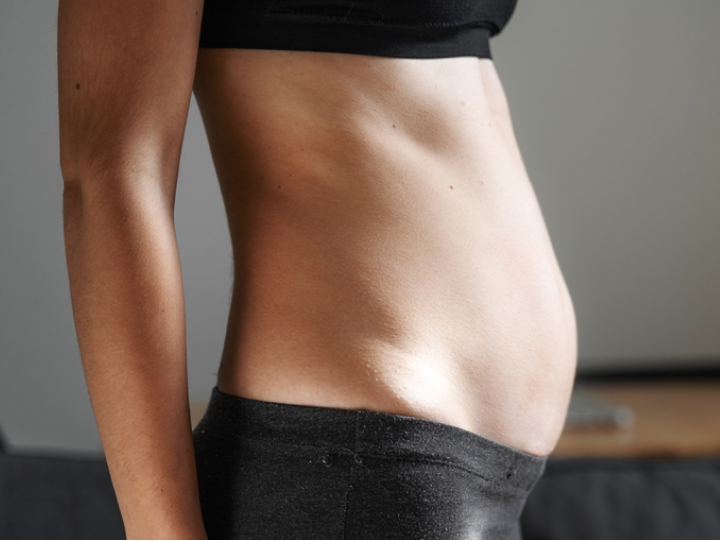
Hormonal Changes
Bloating is more common in women, largely due to how female hormones affect the body. For example, changes in estrogen and progesterone levels around menstruation can lead to bloating, a common premenstrual syndrome (PMS) symptom.
After ovulation (luteal phase), increased progesterone can slow digestion, causing indigestion, constipation, and further bloating. Elevated estrogen levels during this cycle also lead to water retention.
Similar GI symptoms occur during pregnancy as estrogen and progesterone levels rise. Women approaching menopause may also experience bloating from fluctuating estrogen levels.
Post-menopause, reduced estrogen production leads to decreased gut microbiome diversity, impairing digestion, and potentially worsening conditions like irritable bowel syndrome (IBS).
Health Conditions
There are plenty of health conditions that can cause bloating. Different digestive conditions can cause it. For instance, constipation, or the difficulty passing stool, happens when food stays longer in the gut, allowing gut bacteria more time to break down the food and produce more gas.
This excess gas, alterations in food movement in the gut (which affects gas clearance), and increased volume can all lead to bloating.
Other digestive conditions that may lead to bloating include:

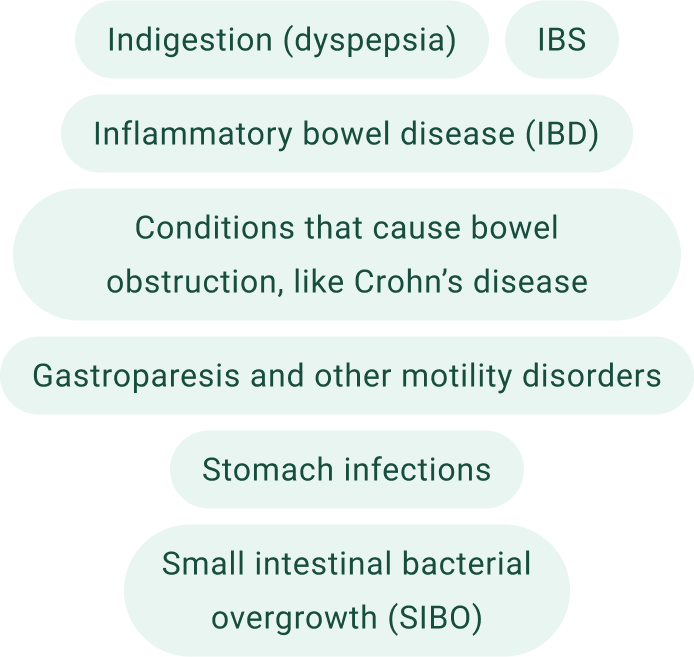
Even medical conditions that are non-digestive in nature can influence your body’s digestive processes.
Factors like altered gut motility, an imbalance of gut bacteria, gas accumulation, and increased sensitivity to pain in your visceral organs (visceral hypersensitivity) can all contribute to bloating. These include:

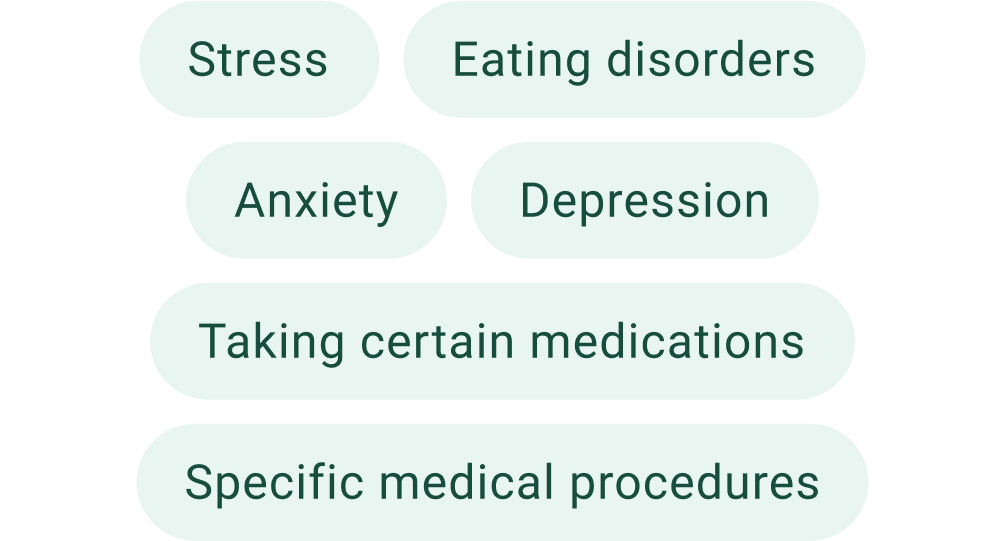

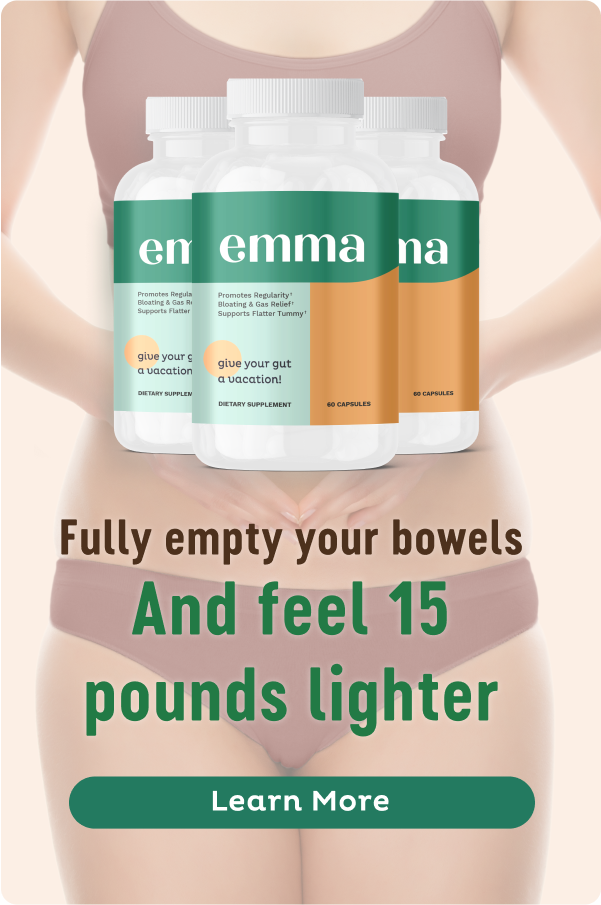
Foods that
Cause Bloating
As mentioned above, what you eat is a primary contributor to bloating. Here are foods you might want to avoid or limit if you want to avoid the uncomfortable feeling of being bloated:
Carbonated Drinks
The fizz in sodas and other carbonated drinks like alcohol can cause you to consume excessive gas. Worse, these drinks are often high in sugar, which causes blood insulin levels to rise, triggering the body to retain water and sodium.
Foods High in Sodium
Too much sodium can cause your body to retain water and possibly alter the gut microbiome. Foods high in salt include processed and fast foods. Fried, greasy, and fatty foods typically have high sodium content, too.
Fatty Foods
The body takes longer to digest fats. Fat slows gastric emptying, so it stays in the gut longer, causing symptoms like bloating and abdominal pain or discomfort. Examples of fatty foods include fast foods, fried and greasy foods, processed meats, and most desserts.
High-Fiber Foods
When gut bacteria in the colon digest hard-to-digest carbohydrates, they produce gasses like hydrogen, carbon dioxide, and methane. Eating high-fiber foods can also promote the growth of good fiber-digesting bacteria, which produce gas. However, sometimes, excessive gas is produced.
For instance, a particular group of bacteria called archaea produce excessive methane gas, which slows down gut motility. Worse, the overgrowth of this methane producing bacteria may creep up from the colon to the intestines, causing SIBO, which causes symptoms like constipation, abdominal pain, and bloating.
Foods high in fiber include most vegetables, including green leafy vegetables, peas, beans, carrots, and artichokes. Fruits, oats, nuts, and seeds are also good sources of fiber.
FODMAPs
FODMAPs, short for fermentable oligosaccharides, disaccharides, monosaccharides, and polyols, are a collection of short-chain carbohydrates that are poorly digested by the body.
- Fruits, like pears, avocadoes, apples, and mangoes
- Dairy products like yogurt, soft cheeses, and milk
- Honey
- Vegetables and legumes like beans, asparagus, cabbage, cauliflower, and Brussels sprouts
- Sweeteners like mannitol and sorbitol
Gas-Producing Vegetables
Legumes, beans, and cruciferous vegetables like brussels sprouts, kale, broccoli, and cabbage contain raffinose. The body can’t digest this sugar, leading to gassiness and bloating.
Natural Remedies for Bloating

Natural remedies can help reduce bloating by aiding digestion and releasing gas. For instance, a 2023 study found that ginger significantly improved symptoms of dyspepsia, such as prolonged fullness, abdominal pain, and bloating.
Another study confirmed that peppermint oil positively affects the gastrointestinal tract and is a safe, natural treatment for bloating.
Other herbal ingredients that can help reduce bloating include:

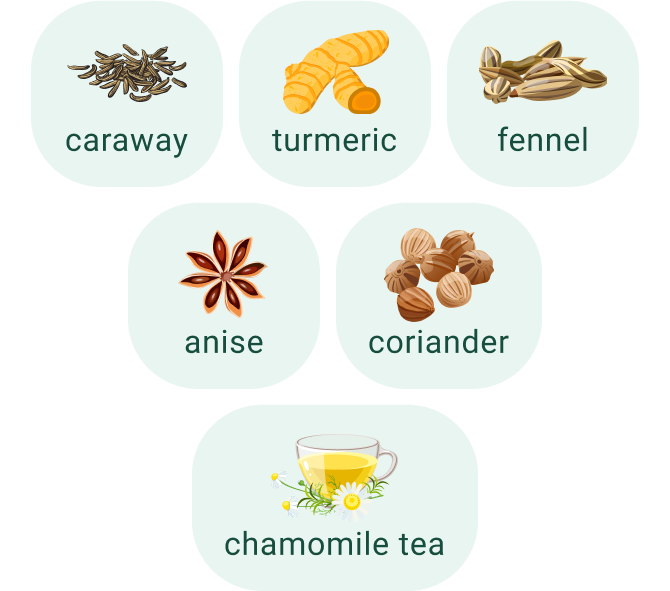
Changing your diet can make a big difference, too. Limiting FODMAPs has been shown to reduce bloating for 50 to 82%of people, highlighting how effective a low FODMAP diet can be in managing bloating.
Probiotics are believed to help with bloating by rebalancing gut bacteria, although their effectiveness remains uncertain. Due to limited evidence, the American College of Gastroenterology (ACG) advises against using probiotics for bloating and IBS.
Nonetheless, numerous studies have highlighted their benefits for various GI disorders. For example, a 2018 systematic review found that specific probiotics can reduce bloating and distention in some individuals with IBS.
How to Reduce Bloating Quickly
Bloating tends to resolve on its own, but if you’re looking to get rid of it quickly, here are some ways to speed up the process:
Take a Walk
Physical activity stimulates the gut muscles to move and expel gas and stool. Even 10 to 15 minutes of physical activity after eating a meal can relieve bloating and is more effective than medications that promote gut movement.
Do Some
Deep Breathing
Diaphragmatic or deep breathing offers numerous health benefits, such as improved blood flow, reduced heart rate, and enhanced mood. It is also frequently recommended to help manage stress related to gastrointestinal symptoms.
But beyond promoting relaxation, it also activates the parasympathetic nervous system, enhancing gut motility and frequency of bowel movements, which helps relieve bloating.
Take Gas
Relief Capsules
Over-the-counter (OTC) medicines like simethicone can help break up bubbles and move trapped gas that causes bloating.
Do Some Yoga
Aside from qualifying as a physical activity, stretching your abdominal muscles through yoga poses helps promote peristalsis or the wave-like contractions that move food through the GI tract. Certain yoga poses also encourage the release of gas, including Happy Pose and Child’s Pose.
Massage Your Tummy
Massaging your abdomen can stimulate peristaltic movement and help get your bowels moving. Lie on your back and trace your colon’s path: start at the right hip, move up to the ribcage, across to the left, and down to the left hip. Repeat as needed.
Relax With
a Warm Bath
A 2018 Frontiers study suggests that stress diverts blood from the gut and heightens pain sensitivity, resulting in slower bowel movements and heightened discomfort.
A warm bath can counteract stress, soothe the stomach, and relax muscles, aiding in the relief of bloating and associated abdominal pain.
Difference Between Bloating
and Weight Gain

Feeling your pants tighten around your midsection can be unsettling, and it’s common to wonder whether it’s just bloating or actual weight gain. Bloating is typically temporary, often caused by trapped gas, constipation, or general abdominal fullness.
Meanwhile, weight gain occurs gradually and is usually due to accumulating excess fat around the midsection from overeating and insufficient physical activity.
Here are some ways to tell the difference:
- If the fullness is just in your belly, it’s likely bloating. It might be fat if you notice it in other areas like your thighs.
- Bloating makes your stomach feel hard and tight, whereas excess fat is usually softer.
- Bloating often comes with other discomforts, such as constipation, cramping, and excess gas.
- Consider the timing. Feeling fuller around specific times, like after eating or during your menstrual cycle, typically points to bloating. On the other hand, abdominal fat tends to be more consistent.


Tips for
Preventing Bloating
Most cases of bloating are associated with your eating habits. Adopting particular lifestyle and diet changes can make the difference in avoiding this uncomfortable feeling:
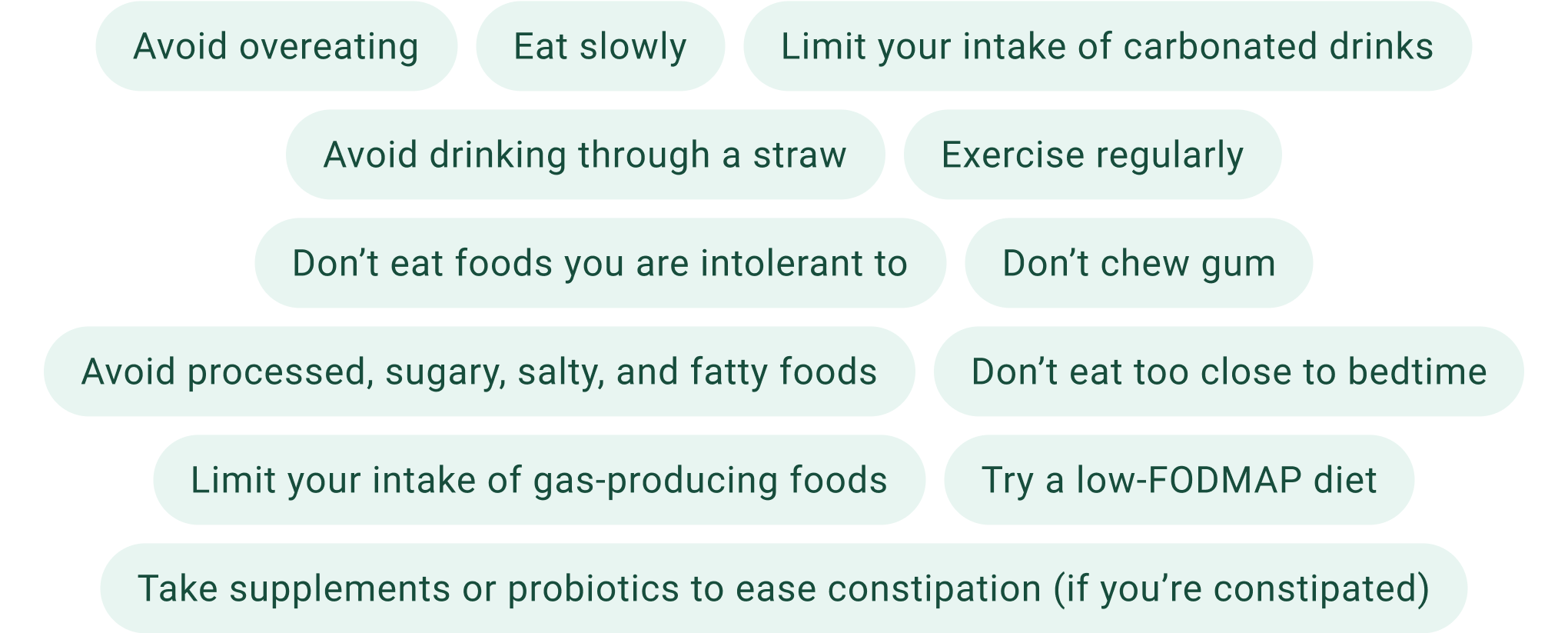
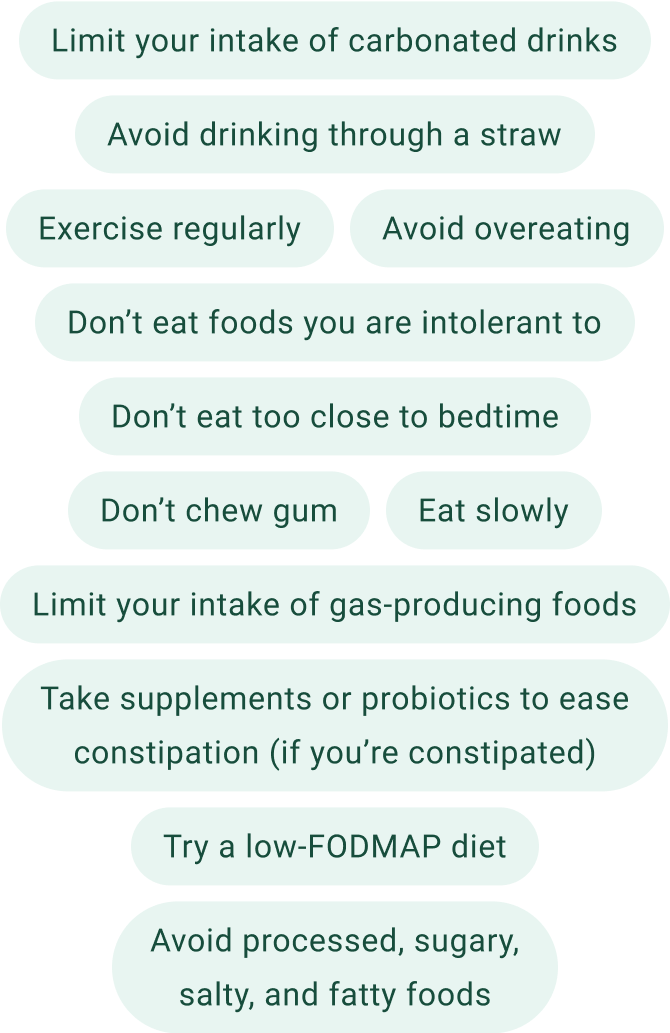
Note: While probiotics are often recommended for bloating and constipation, the American College of Gastroenterology (ACOG) advises caution due to the potential risk of increasing methane-positive SIBO.
In relation to this, a study found that individuals with high colonic methane levels responded better to a low FODMAP diet than to probiotics.
That being said, it may be more effective to use dietary supplements like Emma Relief, which target and eliminate methane-producing, digestion-slowing gut bacteria, addressing the root cause of bloating and other digestive symptoms.
Is Bloating a
Sign of a
Serious Medical Condition?
Bloating is rarely a cause of concern. However, it may also be a symptom of something more serious.
If you have any of the following symptoms accompanying bloating, talk to your doctor for further evaluation:
- unintentional weight loss
- fever
- vomiting
- swelling or lump in the tummy
- bloody or dark stool
- feeling of incomplete evacuation
- sudden or severe, prolonged pain
- difficulty or painful swallowing
- extreme diarrhea
- loss of appetite
- feeling full quickly
Experiencing these symptoms could indicate serious gastrointestinal issues such as pancreatic insufficiency, peptic ulcers, or celiac disease. Bloating can also stem from fluid accumulation in the abdomen (ascites), associated with liver disease and kidney failure. It can also be an early indicator of cancer.
How Long Does Bloating Typically Last?
Exactly how long bloating lasts depends on what caused it. Existing GI conditions, underlying medical conditions, and some of the medications you’re taking can influence its duration.
Generally, occasional bloating from a meal should ease up within a few hours or days. Food takes 1 to 3 days to move through your digestive tract, but the exact duration depends on the type and amount of food you consume. If you’re constipated, your bloating may not ease up until you poop.
Bloating due to hormonal fluctuations should resolve once your hormones balance out. For instance, bloating tends to go away once you have your period. If you’re in your perimenopause, you should experience less bloating when you reach menopause since your hormones won’t fluctuate as much.
When to See a Doctor About Bloating

Bloating after eating certain foods, due to constipation, during menstruation, or in pregnancy is normal. If it comes and goes and follows a regular pattern, it’s typically related to digestive or hormonal issues and usually isn’t a cause for concern.
However, consult your healthcare professional if:
- bloating that lasts more than three weeks
- frequent bloating (>12 times a month)
- bloating doesn’t improve with lifestyle and diet changes
- bloating interferes with movement or usual activities
Takeaway
Everyone has felt bloated at some point. Often, it’s related to what and how we eat. Beyond seeking quick fixes for relief, understanding the reasons behind your bloating can empower you to make long-term changes in your diet and lifestyle to prevent it.
While occasional bloating is common and typically harmless, persistent symptoms warrant a visit to your doctor to rule out more serious conditions.
If you're looking for a targeted approach to combat bloating, consider trying Emma Relief. This supplement eliminates methane-producing bacteria in your gut, clearing bloating, easing constipation, and increasing gut motility to let you have your regular, daily poops.
Explore Emma Relief today for a healthier gut and effortless, effective digestion.












